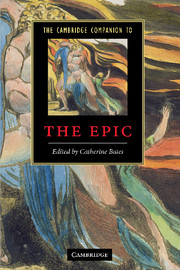Book contents
- Frontmatter
- 1 The Epic of Gilgamesh
- 2 Greek epic
- 3 Roman epic
- 4 Heroic epic poetry in the Middle Ages
- 5 Dante and the epic of transcendence
- 6 Italian Renaissance epic
- 7 Camões’s Os Lusíadas: the first modern epic
- 8 The Faerie Queene: Britain’s national monument
- 9 The seventeenth-century Protestant English epic
- 10 Mock-heroic and English poetry
- 11 Romantic re-appropriations of the epic
- 12 Ezra Pound, T.S. Eliot, and the modern epic
- 13 Derek Walcott’s Omeros
- 14 Epic in translation
- Guide to further reading
- Index
2 - Greek epic
Published online by Cambridge University Press: 28 May 2010
- Frontmatter
- 1 The Epic of Gilgamesh
- 2 Greek epic
- 3 Roman epic
- 4 Heroic epic poetry in the Middle Ages
- 5 Dante and the epic of transcendence
- 6 Italian Renaissance epic
- 7 Camões’s Os Lusíadas: the first modern epic
- 8 The Faerie Queene: Britain’s national monument
- 9 The seventeenth-century Protestant English epic
- 10 Mock-heroic and English poetry
- 11 Romantic re-appropriations of the epic
- 12 Ezra Pound, T.S. Eliot, and the modern epic
- 13 Derek Walcott’s Omeros
- 14 Epic in translation
- Guide to further reading
- Index
Summary
Like other Indo-European peoples, the Greeks of the early period delighted in poetry and song which glorified the deeds and destinies of great heroes, their predecessors and, as they often believed, their ancestors. Such songs illustrated the nature of the world and showed their own connection with the gods. In most traditions, once literacy comes in, such oral poems look old fashioned. They lose favour, they are not written down, and soon they are forgotten. Sometimes a revival of interest may lead antiquarians to search and to rediscover some of them. That was the fate of the Old English epic of Beowulf, which was rescued, surviving in a single manuscript, from the wreck of a larger oral literature. Most of the old heroic songs, however, simply disappear. When learned men come to search for them, they are not to be found. That is what happened to the epic poems that were sung in early Rome, before the impact of Greek literature from the third century BC. Cicero already knew only a vague tradition that they had existed; he wished, vainly, that he could read them. Macaulay's Lays of Ancient Rome were meant as an attempt to recreate a couple of those lost martial songs. The Greek tradition was importantly different. When literacy came in, many of the old songs were lost; but the Iliad and the Odyssey - the two long oral epic poems ascribed to 'Homer' - did not fall from favour. They always continued to be recited, read and highly valued. Familiarity with Homer was expected of any Hellene not utterly illiterate. The epics are characterized by the regular repetition of formulaic phrases and verses, originally a mnemonic device for the singer, who performs by constant re-creation from memory.
- Type
- Chapter
- Information
- The Cambridge Companion to the Epic , pp. 13 - 30Publisher: Cambridge University PressPrint publication year: 2010



